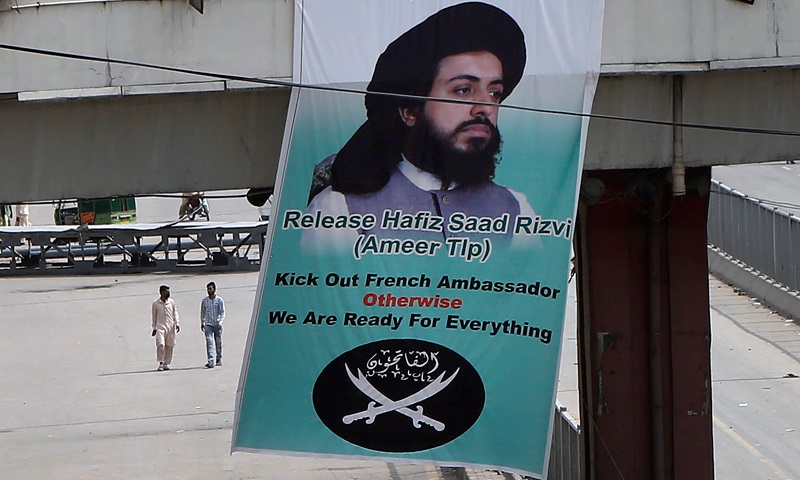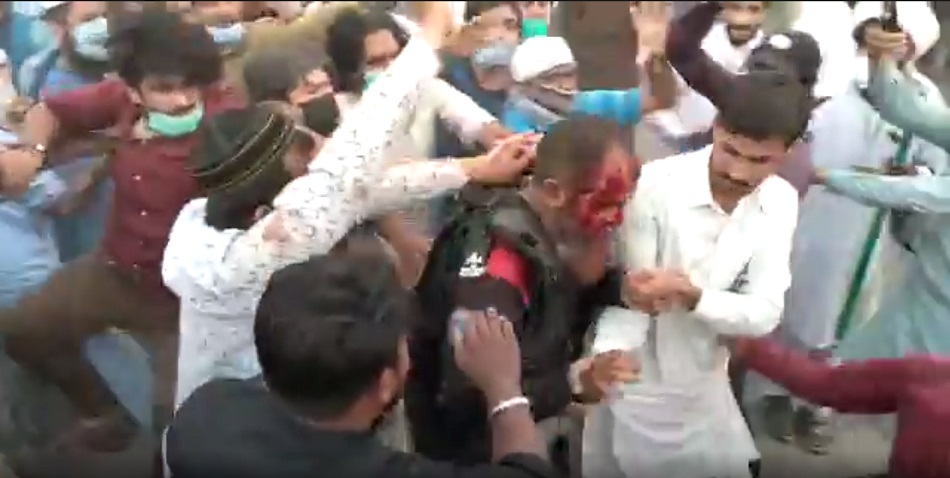
Pakistan’s religious organization Tehreek-e-Labbaik Pakistan (TLP), which is fully backed by the Pakistan Army and has wide political support has now been banned by the Pakistani regime. Violence and protests have been going on across Pakistan for the past few days by the Tehreek-e-Labbaik Pakistan (TLP) all over the country.
The spate of recent protests by Tehreek-e-Labbaik began on April 12 after the arrest of party chief Saad Rizvi from Lahore. Earlier, the Tehreek-e-Labbaik Pakistan (TLP) had warned the Pakistan government that if the French ambassador is not deported from Pakistan by April 20 and diplomatic relations with France are not terminated, the TLP would sit on a protest at Faiz Abad Square in Islamabad from April 20. Thereafter Imran Khan-led Pakistan’s civil regime panicked and Saad Rizvi was arrested to prevent a sit-in on April 20. But soon after Saad Rizvi’s arrest TLP instigated violent protests across Pakistan.

Activists of this religious tanzeem (organization) have blocked roads in several cities that include Lahore, Islamabad, Karachi and Quetta and have allowed sit-ins. More than 300 people have been injured in the clashes and five others, including the two policemen who were injured in an attempt to disperse the protesters, died in this clash.
Following violent protests by the Labbaik movement, Pakistan’s Interior Ministry banned the organization under 1997 Anti-Terrorism Act. Announcing the ban, Pakistan’s Interior Minister Sheikh Rashid said that the decision was taken on the recommendations of Punjab government. Sheikh Rashid explained that the ban on Tehreek-e-Labbaik (TLP) would destroy TLP’s political activities and freeze their financial assets. This ban was imposed under Rules 11B of the Anti-Terrorism Act 1997 for which only the cabinet requires approval.
It may be recalled that in 2017 when Nawaz Sharif was in power and the Tehreek-e-Labbaik Pakistan (TLP) movement was coming to Islamabad to hold a sit-in, then the interior minister Sheikh Rashid, who was in opposition at the time had warned the government and came out in support of TLP. Rashid had said that from now there would be a movement of the Prophet (peace be upon him) that even your looted wealth will not work and it will also bring down the outdated system. However, now that the TLP’s sit-in was announced against government of Imran Khan the tanzeem has been banned and is being called as a terrorist organization. The violent protests of TLP which was appreciated by Sheikh Rashid during his opposition days has now been declared wrong when his party is in power at Islamabad.
According to another report released by the Interior Ministry, people from across Pakistan were arrested during violent protests by the Tehreek-e-Labbaik Pakistan over the past three days of which 1,669 were arrested in Punjab and 228 in the Sindh province. The report said that 193 people were arrested from Khyber-Pakhtunkhwa and 45 from Islamabad while anti-terrorism cases have been set up against the detainees.

Tehreek-e-Labbaik Pakistan — Background
Tehreek-e-Labbaik Pakistan (TLP) was founded by Khadim Hussain Rizvi in 2017. Khadim Hussain Rizvi, a Barelvi-minded cleric worked in the department of endowments and was a preacher in a mosque at Lahore, Pakistan.
In 2011, when a Punjab Police Guard Mumtaz Qadri assassinated Punjab Governor Salman Taseer, Khadim Hussain Rizvi had openly supported Mumtaz Qadri. Due to which Rizvi was fired him from the Punjab’s department of endowments.
After this not only did Khadim Hussain Rizvi moved for the protection of Prophethood Law and Article 295C of the Constitution, but also remained active for the release of Mumtaz Qadri. Khadim Rizvi held a rally in January 2016 in favor of Mumtaz Qadri without the government’s permission. Later, when Mumtaz Qadri was hanged Khadim Rizvi turned to Islamabad’s D-Chowk to protest against his hanging. However, after negotiations with the government, the protest ended within four days.
At the end of this sit-in, Khadim Rizvi announced that he would form a regular religious party in the name of ‘Muqtah Labbaik Pakistan al Rasoolullah’. At this time the movement was not registered by the Election Commission as a political party, but Sheikh Azhar Hussain Rizvi, the party-backed independent candidate ran for office in September 2017 and won 7,130 votes in the National Assembly of Pakistan, which was vacated after the disqualification of former Prime Minister Nawaz Sharif.

Under the leadership of Khadim Rizvi this movement once again turned towards Islamabad against the proposed amendments in the Election Act 2017 by the then Minister of Law Zaid Hamid in November 2017 at Faizabad, the confluence of Rawalpindi and Islamabad. A long but seemingly successful sit-in against the amendment to the law greatly increased the reputation of not only Khadim Rizvi but also the movement of Labbaik in Pakistan. It’s quite clear that behind this sit-in of the Labbaik movement was Pakistan Army and the ISI. The Labbaik movement helped replace removal of the then Prime Minister Nawaz Sharif and the abolition of Muslim League’s vote bank in Punjab. However, it also became clear that the Pakistan Army distributed money to all those who took part in this Labbaik sit-in. As a result of the sit-in at Islamabad the law minister had to resign and for the first time, the government signed an agreement with the Tehreek-e-Labbaik Pakistan (TLP) acknowledging their demands at the sit-in.
When a video of money being distributed by a Pakistani military officer went viral, Justice Qazi Faiz Isa, a senior judge of the Pakistan Supreme Court who is from Balochistan, took note and exposed the hands involved behind the sit-in. Justice Qazi Faiz Isa also revealed the names of other people who were involved.
The military establishment and Imran Khan’s government filed a case in the Supreme Court against Justice Qazi Faiz Issa of the Pakistan Supreme Court for taking action against Pakistan Army, which is still pending today. Today Pakistan’s mainstream media is openly casting aspersions on Justice Qazi Faiz Isa’s character and his family is also being defamed. As a result Pakistan’s judiciary has also become a supporter of the Labbaik movement or the Islamist extremist ideology.
Taking advantage of the success of 2017 Islamabad sit-in, TLP soon announced its candidacy across four provinces in the 2018 general elections and fielded a total of 559 candidates in the National and Provincial Assembly, two of whom were candidates from the Sindh Assembly. Tehreek-e-Labbaik Pakistan (TLP) soon emerged as the fifth largest party in the country in terms of votes in the National Assembly elections that received more than 2.2 million votes. TLP boasts of three members in the provincial assembly at present. In addition, Khadim Rizvi also had a madrassa in Lahore named Abu Ghaffari. TLP has been made a major force by providing full political and logistical support to the Pakistani military and its support organizations, PTI (Pakistan Tehreek-e-Insaf) and the Q-League, among others.
Build up of the current scenario
In November last year Khadim Rizvi led a movement against France’s Charlie Hebdo magazine for publishing sketches on Prophet Mohammed. Tehreek-e-Labbaik Pakistan (TLP) under Khadim Rizvi demanded that French ambassador be deported from Pakistan. TLP also demanded a total boycott of French products in Pakistan and severance of all diplomatic relations with France. However, Khadim Rizvi died in November 2020 and his son Saad Rizvi was appointed as the new chief of Tehreek-e-Labbaik Pakistan.
After Khadim Hussain Rizvi’s death and Saad Rizvi’s appointment as the chief of Tehreek-e-Labbaik the Pakistani regime entered into a second agreement with TLP regarding the deportation of French ambassador from Pakistan and TLP’s demands for an end to diplomatic relations with France. Under this agreement, the Pakistani regime agreed to not only take steps to deport the French ambassador from Pakistan by April 20, 2021 but to also remove names of all members of the Tehreek-e-Labbaik from the list of Fourth Schedule, which effectively means striking off the names of TLP cadre from the list of terrorists.
Imran Khan’s government signing an agreement with the Tehreek-e-Labbaik for deportation of the French ambassador and severance of diplomatic relations with France was practically impossible. Imran Khan took this agreement quite lightly and thought that the Tehreek-e-Labbaik will forget the agreement and that the sit-in being called off the entire movement would fizzle out.
But when Tehreek-e-Labbaik announced another sit-in at Islamabad on April 20 the government panicked and arrested TLP chief Saad Rizvi. Now the Pakistani regime has reached a dead end because Imran Khan’s government is not in a position to accept TLP’s demands for deportation of the French ambassador and termination of diplomatic relations with France, nor is it possible. On top of this there is this pressure of being black-listed by the Financial Action Task Force (FATF). Pakistan is already on the FATF grey list.
France is among the FATF members that has taken steps against money laundering. If Pakistan takes any action against France under pressure from radical Islamists of Tehreek-e-Labbaik, in all likelihood Pakistan will then be blacklisted by the FATF. To complicate matters further, the French government has already issued instructions to its citizens, including their traveling staff in Pakistan, to leave Pakistan immediately.
Prominent Pakistani journalists and political analysts are calling Imran Khan’s ban on Tehreek-e-Labbaik a mere pretense as they believe that the government simply cannot implement it.
Ban on social media in Pakistan
Tehreek-e-Labbaik is quite active on social media like other political parties in Pakistan. The Twitter account of the former head of the organization Khadim Rizvi, which had millions of followers, was closed on a complaint by the government of Pakistan, but there still are numerous accounts and pages on the organization’s Facebook and Twitter, while there are two official channels on YouTube.
Tehreek-e-Labbaik has several thousand followers through these social media accounts which the organization uses to mobilize the public to come for protests and sit-ins. Social media is also an important means of popularizing the TLP’s ideology and drumming up support for it.
The Labbaik movement is, in fact, a product of Pakistan Army’s Islamist religious ideological production, under which it sells Islamist and religious extremist ideologies to Muslims and arouses religious sentiments of Pakistani Muslims.
According to political analysts, although Pakistan Army was instrumental in installing Imran Khan as Pakistan’s Prime Minister, yet during the last two and a half years, Imran Khan’s government has not delivered anything noteworthy. On top of this the opposition’s coalition PDM has called Pakistan Army bad for the country’s economy which is responsible for worsening situation in Pakistan. Country’s corruption, restriction on freedom of expression, increase in enforced disappearances, control of mainstream media and social media and the worsening of economy has led people from all walks of life to blame Pakistan Army for all their ills. This has led to a low morale in the ranks of Pakistan Army.
Yet the failure of current civil government of Pakistan in the form of Imran Khan is entirely the work of Pakistan Army because the civil government of Imran Khan is just a façade that has no authority in its hands. Pakistan’s state and routine administrative affairs are also being run entirely by the military, which, due to lack of experience, is leading Pakistan to anarchy because the military does not have a political vision and no country can be coached at gunpoint.
The buzz in Islamabad is that the Pakistan Army is not happy with Imran Khan’s government, so the movement of Tehreek-e-Labbaik has been used to prepare ground for removal of Imran Khan’s government. This is a tested method of Pakistan Army that had earlier used Tehreek-e-Labbaik to topple Nawaz Sharif’s government. Now another drama is being propagated to gain credence for the removal of Imran Khan’s government.
Also if one closely analyzes the backend support for radical Islamist and religious extremist organizations such as Taliban, ISIS, Al-Qaeda or the Tehreek-e-Labbaik the involvement of uniformed men of the Pakistan Army can be clearly seen. These Islamist terrorist organizations are all assets created by the Pakistan Army who are used as pawns to further the interests of uniformed officers and to create mayhem across the world in the garb of Islamic religious activities.
World has declared ISIS and the Al-Qaeda as largest and most powerful terrorist organizations but in reality it’s the Pakistan Army that calls the shots and has direct influence over their actions. It’s time the world accepts this reality.
